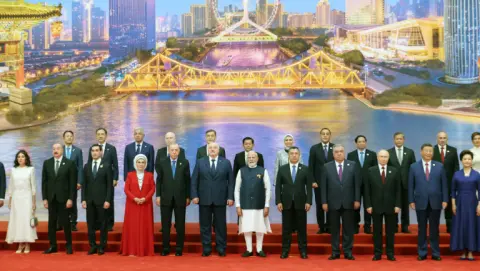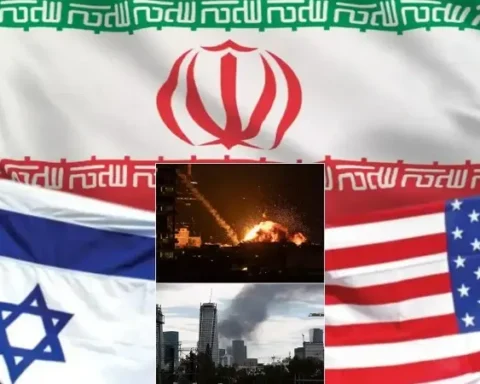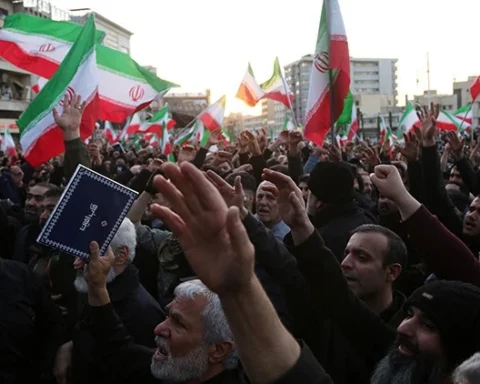Sept. 6—The world is no longer the same as it was before the events of Aug. 31–Sept. 3. The week began with the two-day heads-of-state meeting of the Shanghai Cooperation Organization (SCO) in Tianjin, China, which saw the organization’s largest ever attendance with a total of 26 nations representing 42% of the world’s population. Two days later, on Sept. 3, China hosted a major celebration on the occasion of the 80th anniversary of the defeat of Japan in 1945, showcasing one of the largest and most impressive military parades in modern history. Over the course of these several days, the message was unmistakably clear: There is a growing, new paradigm in the world, and it has the power and vitality to bring the world into a new, post-colonial era.
At the SCO summit, dozens of economic agreements were signed, major new initiatives were announced, and a diverse grouping of nations was brought together in a significant show of solidarity. Notably, Russian President Vladimir Putin was the guest of honor, whom Chinese President Xi greeted as “lao pengyou,” or old friend. The two set the tone for the event, with President Xi starting his address to the SCO Heads of State meeting by reviewing the history of the SCO and its accomplishments over more than 20 years, noting that it has now become the world’s largest regional organization. With this in mind, he said, “Let us stay true to SCO’s founding mission, step up to undertake our duties … and march steadily toward a brighter tomorrow of a community with a shared future for humanity.”
Among the major announcements at the summit was Xi’s proposal for a Global Governance Initiative. Its five points are: adhere to sovereign equality; abide by international rule of law; practice multilateralism; advocate the people-centered approach; and focus on taking real actions. Taken in the context of ongoing strategic developments, keen observers will understand that this is not some new push for “globalism” but rather a proposal of principles by which the world can move beyond the bestiality of British geopolitics. President Putin welcomed Xi’s initiative, saying it “will play an important part in addressing the global governance deficit,” and that it is “particularly relevant at a time when certain countries continue to pursue dictatorial practices in international affairs.”
Despite the sanctions, blackmail, and other efforts by Western nations to generally prevent any widespread unity from across the Global Majority, attendance in Tianjin was extraordinary and diverse. Among the 26 nations represented was Türkiye—a NATO member and important bridge between East and West—whose President Recep Tayyip Erdoğan held bilateral meetings with both Presidents Xi and Putin. Europe was represented by President Aleksandar Vučić of Serbia and Prime Minister Robert Fico of Slovakia, each of whom held friendly meetings with Putin.
Additionally, the heads of state of Iran, Pakistan, and Malaysia attended, as did those of Armenia and Azerbaijan—two countries that have been closely courted by the West and have a strategic location on the underbelly of Russia.
But perhaps the most visible example of the global sea-change underway was the attendance by India’s Prime Minister Narendra Modi, who had previously not visited China for seven years due to tensions over their border dispute. Modi’s appearance at the summit not only sent countless Western elites into a fury over the repeated images of him sharing laughs and embraces with Putin and Xi, but it gave a clear indication that the Global Majority is no longer bending to the dictates of the West.
Like BRICS, the SCO is not a simple “alliance” hedging for more power and influence on the world stage, nor is it an anti-American or anti-Western affiliation. Rather, these groupings are illustrative of an organic process that is growing and developing as part of a new world system—made necessary out of the decay and collapse of the bankrupt trans-Atlantic. As Russian Foreign Minister Sergey Lavrov said after the summit, the SCO participants are merely working to uphold and advance the values and principles of international law in the face of increasing suppression by Western nations, even though these are “the very principles once promoted by the West itself.”
Together, these two organizations represent 75% of the world’s population. Not only this, but there are currently 12 more countries that have applied to join the SCO, and many more than that which have applied to join BRICS. Thus, this truly has become the Global Majority, and is not something that is going away.
Modi, Xi, Putin, and the RIC
Prime Minister Modi arrived in Tianjin shortly after U.S. President Donald Trump had enacted 50% tariffs on India, partly in response to India’s purchases of Russian oil. The situation had unfolded over the previous month following Trump’s announcement of the tariffs, to which Modi responded that India would “stand firm” against American pressure. However, hovering in the background of this has been the potency of a true Russia-India-China friendship, both as regards the continued strengthening of BRICS and SCO, of which the three nations are pillars, and the even more substantial concept of the R-I-C.
The RIC was initially proposed in 1998 by Russian Prime Minister Yevgeny Primakov, who said at the time that a “strategic triangle” between the three countries could become the backbone of a new system of collaboration and economic development. The grouping has loosely worked together since then, though British-aligned forces have been hoping dearly to keep them apart, particularly by fanning the tensions between India and China. But recent developments may have tipped the situation in a new direction, and Modi and Xi appear intent on burying the hatchet.
In Modi’s meeting with Xi, the two stressed their appreciation of the progress in their relations since their bilateral meeting in Kazan, Russia, last year—their first formal talks in five years—and noted that, as the two most populous countries on the planet, their cooperation is linked to the stability of the whole world. The “dragon and the elephant can dance together,” Xi stated. The talks took place in the context of a flurry of diplomatic meetings between officials from both countries over the recent months, and normal diplomatic relations are slowly being restored.
Modi’s meeting with Putin was equally significant. In 2017 India became a member of the QUAD security alliance along with Australia, Japan, and the United States—widely viewed as the “Asian NATO”—and has kept a complicated yet close relationship with the West. Despite this, India has maintained its good relations with Russia and dramatically increased its purchases of Russian oil from 2022 on. Enormous pressure has been brought down on India to break off its friendly relations with Russia and cease its purchases of Russian oil, with Trump’s tariffs only the latest in this regard.
But when Modi greeted the Russian President, he warmly emphasized “the depth and comprehensiveness of our special privileged strategic partnership,” and added, “Even under the most difficult circumstances, India and Russia have always moved forward together, shoulder to shoulder.” When Putin visits India later this year, “1.4 billion Indians will eagerly welcome you,” Modi told him. Later that day and into the next, pictures and video of Modi riding in Putin’s limousine and smiling amicably with the Russian President flooded the news. Western pundits were even more aghast when they later saw video of Putin, Modi, and Xi holding hands and talking together as equals.
Not only are India’s leaders not listening to the West, but they appear to be going in the opposite direction. The CEO of Russian state nuclear company Rosatom, Alexey Likhachev, said on the sidelines of the SCO on Sept. 1 that India is extremely interested in Russia’s fourth-generation nuclear power plants, and also wants to substantially increase its trade through Russia’s Northern Sea Route. There are also reports that India is planning to increase its purchases of Russian crude oil, perhaps by as much as 10-20%, further solidifying the potential of Primakov’s RIC.
Economic Development as the Cornerstone
When the SCO was founded, it was largely focused on the need for cooperation on security-related issues, counter-terrorism, etc. However, the discussion has evolved over the years, through the announcement of China’s Belt and Road Initiative—which runs through many of the SCO member states—and the 2014 Eurasian Economic Union. The general bankruptcy of the trans-Atlantic financial system, kept afloat by tens of trillions of dollars “printed” after the 2008 financial crisis, increasingly became an impossible factor to ignore. But it was the outrageous sanctions imposed on Russia following the outbreak of the Ukraine conflict, and the kicking of Russia out of the SWIFT payments system, that proved no nation was safe under the politicized Western financial system.
The SCO, therefore, like BRICS, is increasingly working toward a new, independent economic architecture—and fast. During the summit, President Xi proposed the establishment of an SCO Development Bank “to provide stronger underpinnings for security and economic cooperation among member states.” He also pledged $1.4 billion in loans to SCO member states over the coming three years. While small and in its early stages, such a bank could provide lines of credit for development that are entirely outside the control of Western institutions. As Chinese Foreign Minister Wang Yi said after the summit, the bank “will give a strong boost to the infrastructure development and socioeconomic development in SCO countries.”
In his remarks to the SCO, Putin advocated for new financial mechanisms free from meddling by unilateral actors. He called for “the issuance of joint bonds by the SCO member states, the establishment of our own payment, settlement and depository infrastructure, and the creation of a bank for joint investment projects.” Such initiatives are in line with President Xi’s call for the SCO to “become a catalyst for the development and reform of the global governance system,” and to bring relations between the nations of the world out of geopolitics and into conformity with the principles of “non-alliance, non-confrontation and not targeting any third party.”
In addition to the discussion of financial reform, there is the equally profound shift of the world’s economic center-of-gravity to the East. After the trilateral meeting among Putin, Xi, and Mongolian President Ukhnaagiin Khürelsükh on Sept. 2, Gazprom CEO Alexei Miller announced that a “legally binding memorandum” had been signed by the three leaders for the construction of the massive Power of Siberia 2 gas pipeline. The pipeline will be capable of transporting 50 billion cubic meters (bcm) of natural gas per year, through Mongolia, to China. Added to the existing Power of Siberia 1 pipeline, which Miller said will be increased to 44 bcm, and the pipeline running from Russia’s Sakhalin Island, now increasing to 12 bcm, the total Russian gas that will flow to China will potentially be more than 100 bcm per year.
Considering that Russia’s total natural gas sales to Europe before the Ukraine war were between 150 and 180 bcm, it’s clear that Russia is moving to replace its previous markets with friendlier and more reliable ones. This is a major shift, not only for Russia but for other members of the Global Majority, who are now seeing that the engine of the global economy of the future lies in the Global South and the East.
The same day as Beijing’s Sept. 3 military parade, the Eastern Economic Forum began in Russia’s far eastern city of Vladivostok, with this year’s theme, “The Far East: Cooperation for Peace and Prosperity.” Alexey Chekunkov, Minister for the Development of the Russian Far East and the Arctic, gave some background to the forum in an interview. He said that there are currently 3,800 investment projects underway across Russia’s East and Arctic totaling $148 billion, and as a result these regions are now seeing 3.3 times greater economic growth than the rest of Russia. Electricity demand in these regions, a key marker of economic activity, similarly has increased by 28% over the past decade—double the national average.
These reports are just the tip of the iceberg for what is possible in the domain of the Arctic and Far East. Due to a combination of difficult conditions and a lack of sufficient international collaboration, these resource-rich regions, which hold an enormous potential for the future of mankind, have remained largely underdeveloped. This is now changing.
World War II Commemoration Is More Than a Ceremony
China’s much-awaited 80th anniversary celebration to mark Victory Day in the Pacific sent another shockwave around the world. Leaders of 26 nations—most of whom had just attended the SCO meeting earlier in the week—attended the Sept. 3 ceremony and ensuing parade, where China exhibited some of its most advanced weapons and other military hardware. And there was a lot of it. The display included the debut of several of China’s newest hypersonic ballistic and cruise missiles, a new strategic ballistic missile with an estimated range of 20,000 km, its newest stealth fighter, anti-drone weapons, lasers, tanks, and much more. At the beginning of the parade, a flurry of helicopters flew overhead carrying banners that read, “Justice will prevail, Peace will prevail, The People will prevail.”
The significance of this display was captured by a CNN article which said: “The huge volume of military hardware exhibited shows that China has the industrial might to back up its words” in the same way the United States did to win World War II. “But while U.S. industry spelled the end of the Axis powers 80 years ago, America now doesn’t have the capacity to turn out weaponry in the numbers that China can,” CNN concluded.
But the commemoration held far more meaning than simply a political show of strength. From 1931-1945, China lost more than 35 million of its citizens in the fight to save its nation from Japanese imperialism. As in Russia and other countries of the former Soviet bloc, there is a profound understanding of what the victory of freedom over oppression meant then, and they see its memory as a fundamental principle in the direction the world must take now.
In his address at the ceremony, Xi outlined China’s enormous sacrifices in the war and its long path of rejuvenation, then said: “History cautions us that humanity rises and falls together.” Only when all countries treat each other as equals and support each other “can we prevent the recurrence of historical tragedies,” Xi went on. “Today, humanity again has to choose between peace and war, dialogue and confrontation, win-win cooperation and zero-sum game,” he warned, and stated that China would unflinchingly advance that same commitment. Xi ended his remarks by raising his voice, declaring: “The great rejuvenation of the Chinese nation is irresistible! The noble cause of peace and development of humanity will prevail!”
The parade ended with the release of 80,000 doves and 80,000 balloons, symbolizing the 80th anniversary.
The significance this event holds in both Russia and China was stated even more explicitly by President Putin in an interview he gave to Xinhua News the day before the SCO summit began. “We see that in certain Western states the results of the Second World War are de facto revised, and the verdicts of the Nuremberg and Tokyo tribunals are openly disregarded,” Putin said, adding that “Russia and China resolutely condemn” these attempts to rewrite history. He then said the following: “The memory of the joint struggle of the Soviet and Chinese peoples against German Nazism and Japanese militarism is an enduring value for us…. To mark the 80th anniversary [of victory in the war], we signed a Joint Statement on Further Deepening the China–Russia Comprehensive Strategic Partnership of Coordination for a New Era. This document provides a consolidated response by our countries to attempts by certain states to dismantle humanity’s historical memory and to replace the well-established principles of world order and dialogue forged after the Second World War with the so-called ‘rules-based order’.”
The West Is Invited To Join
While it’s beyond a doubt that this new dynamic is developing “in the East,” it is by no means the case that the West is not invited. During his appearance at the Eastern Economic Forum on Sept. 5, President Putin noted that Russia is already in discussions with the United States about joint projects in the Arctic as well, and even raised the prospect of trilateral projects between the United States, Russia, and China. “All these options are being discussed, they are on the table. We only need a political decision. This is possible, and cooperation in both gas and oil would be mutually beneficial,” Putin said. China has also repeatedly extended a hand of friendship to the West for deeper collaboration.
The doorway is open for the United States and Europe to stop seeing these thriving countries as adversaries and to instead see them as partners. Joint projects in the Arctic are only the beginning, and could become a first step to a blossoming of collaboration in a world hungry for the kinds of massive physical-economic growth needed to counteract decades of parasitical economic policy. Let this potential future collaboration be not only the driver for the revival of the best traditions within the nations of the West, but the end of the oligarchical system that has ruled much of the world for far too long. As Lyndon LaRouche said in 1994 shortly after returning from a trip to Russia:
“If we look ahead to the future of humanity, and look beyond the sinking of the Titanic [the bankrupt trans-Atlantic financial system—ed.], we have an obvious way of reorganizing the world…. And that is to do what the British have always feared—do the geopolitical utmost. Let us foster rails from Brest [Western France] to Vladivostok [Eastern Russia]. Let us foster the development of the silk-route railroad in China. Let us foster collaboration among the two sections of Asia [India and China]…. Now integrate the two in the logical way in which they should be integrated. Which means that you are now in the area of the world’s majority of its population…. This is where the world’s future population will be concentrated. If we’re developing physical economy, these are the trade routes.… Use this infrastructure building to spin off the other industries which are needed … [as] the catalyst for developing the industry.
“We should commit ourselves to such a policy, to such cooperation among sovereign nation states, and let the imperialists who drowned this world in war for a century, let them go hang…. Let us proceed to do that which has been forbidden, [but] which is in the vital interest of our country—to foster this kind of development in Eurasia and in South Asia, and to use cooperation with that as the way to rebuild the world economy.”
Source: https://larouchepub.com/other/2025/5236-sco_and_world_war_ii_commemora.html






